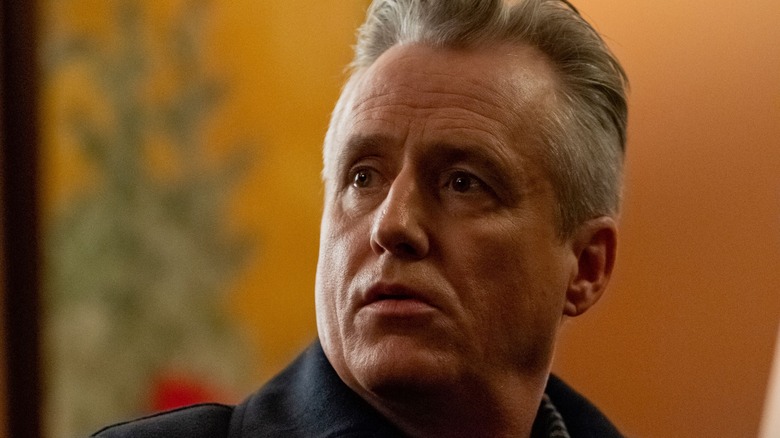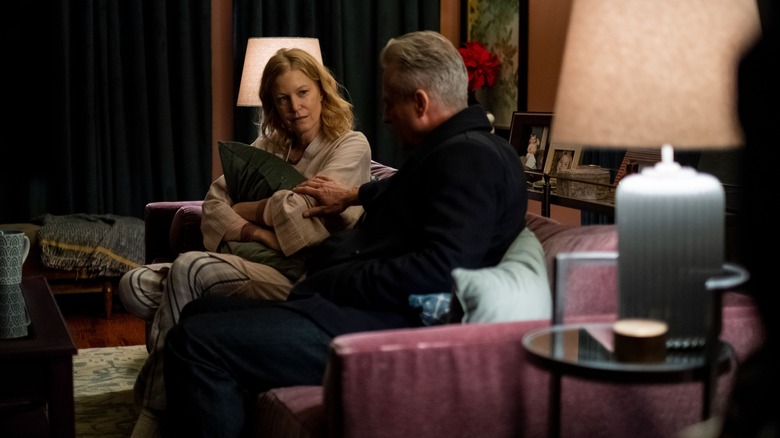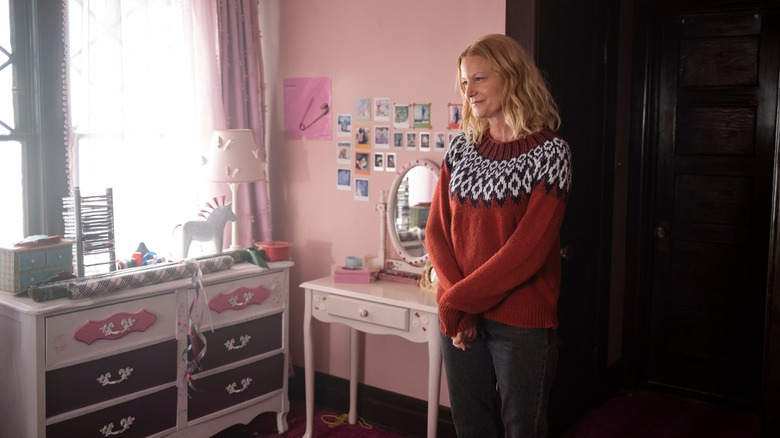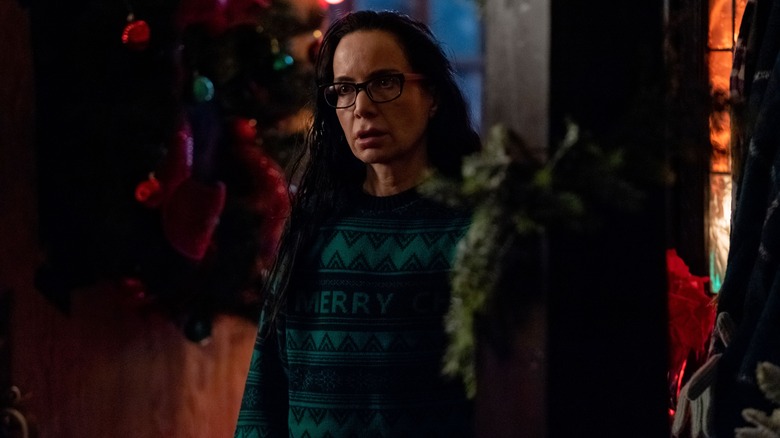Linus Roache On His Most Recognizable Role And Keeping A Dark Secret In The Apology [Exclusive Interview]
Over numerous appearances in film and television, Linus Roache has become somewhat of a chameleonic actor that can lose himself in a role. After memorable turns as Thomas Wayne in "Batman Begins" and the obsessive cult leader Jeremiah Sand in "Mandy," he's shown the ability to convey a calm, compassionate presence in one film and transform into a manipulative villain in another. In Alison Locke's directorial debut "The Apology," Roache has the opportunity to explore both ends of the spectrum, playing a likable character who slowly starts to reveal his true, dastardly self.
Still trying to pick up the pieces after the mysterious disappearance of her daughter 20 years ago, recovering alcoholic Darlene Hagen (Anna Gunn) is planning on making a family Christmas dinner with the help of her best friend, Gretchen (Janeane Garafalo). Late on Christmas Eve, an ominous knock at the door (never a good sign) sets off a brutal chain of events when Darlene's alienated ex-brother-in-law, Jack (Roache), arrives unexpectedly on her doorstep. What seems like a perfectly good excuse at first turns into an emotional confessional that sends the worlds of both characters into turmoil.
In a recent interview, I spoke with Roache about his riveting performance in "The Apology," working with Anna Gunn and Janeane Garafalo in such a claustrophobic thriller, what it was like to play an older version of Harry Styles in "My Policeman," and more.
This interview has been lightly edited for clarity and brevity.
'You take your idea and then you just keep doubling down on it'
You've had a lot of experience doing theatre and Shakespeare. Did "The Apology" feel like it could work as a play? Was that part of the appeal for you?
I wouldn't say it was part of the appeal, necessarily. But yes, it does definitely work as a play or a chamber piece. I mean, I really think it could be done literally as a play. With very little alteration, it would kind of hold up and it wouldn't take a lot to adapt it for the stage. I love the fact that it's a three-hander, but basically a two-hander piece — at least the main body of it. I think what Alison had done in the writing is really set up the dialectic, and you know, the tension between these two characters. And the theme of the movie is so strong, of what it takes to get someone to take responsibility and be accountable for their actions, and to just take that as an idea and then keep doubling down on it. Whether it's theatre or film, I think that's just good storytelling. You take your idea and then you just keep doubling down on it.
I love that "The Apology" was awarded the ReFrame Stamp for a gender-balanced production and produced by an all-female production company. I just love that. Was being part of such a balanced production like that another driving force for you to do a challenging role? Did it make you more or less comfortable with dealing with pretty dark material when Jack starts to open up, so to speak?
I can't say it had an effect on me in terms of, you know, executing on the production on my side of it. It was just wonderful. I think back to my mother who was an actress in the '50s and the '60s and the misogyny she had to put up with and then what I've witnessed in my career in the '80s, '90s, and onwards, and just how much that landscape has changed. I just thought of my mum at one point. It brought tears to my eyes, because she would've been so happy to see such a redress and such a balance in the workplace.
And also just generationally, it was interesting that we took lot of younger people on the set and a lot more ... I don't know what the percentage of men to women was, but it was a lot. And then even doing the sound, doing the ADR afterwards, it was a female-owned sound studio, and the sound record was a woman, too. So I just felt like it's great that — it's been a long time coming, but it's definitely come and I felt very happy to be part of that. Did it change the way I worked? No. Because in the end, my role was very much defined by what Alison had written and what we'd agreed on. So I would've done that no matter what the situation. That's my job to deliver. But it's nice to be part of something that's progressive like that.
'He thinks he's a good man'
Without revealing too much, you have a dark secret in this film, but part of what makes your character, Jack, so interesting is that he's been living with something for a long time and now he's compelled to show up out of the blue on Christmas Eve. Do you think he's a good person underneath it all, or has he just been keeping up appearances all this time?
Well, I think you've basically stated my character's — what's the word — thesis. He thinks he's a good man. That's basically the idea that he cannot let go of. And I think it's not until I really got that and was able to embody that, that then I could sort of hold the weight of the denial. But that self-image is more important to him than anything in the world. So he will fight tooth and nail to defend that. So that's really the idea.
In the beginning, I was really focusing on what he'd done, how he must have lived with it, how tortured he was by it, how he built his life since it had happened, what sort of life did he — filling in all of those gaps. But in the end, it was really the commitment to, "I'm not a bad man, it was an accident." It was an accident. I mean, you can't condone one of Jack's actions, but I suppose he's a character who's still worthy of our understanding in some way. And that made him very interesting to play and a real stretch for me. It was a real push. So I was really grateful. I felt honored, actually, that Allie [Locke] felt she could trust me to take it on.
Well, I think the fact that you show up on Christmas Eve is very telling. Why that night instead of any other night? It's almost cruel. It's a very calculated move, I think, for Jack.
Yeah. And there's a lot of calculate — you realize as it goes on, there's things that look like they just [happen] spontaneously, but he's thought a lot through. But he hasn't completely worked it out. But he's come there with a reason, with a raison d'être. He's in such extreme denial that he can't even do the terrible thing that he wants done. He can't even admit it to himself. I just think it's a brilliant idea and she executed it really, really well.
And the story gets more and more intense as it plays out. Did you shoot in sequence?
Not entirely, but as much as was possible. Yeah, it was good that way. And also, as you know, it's not a big budget film, so there wasn't time to just put my makeup on all my wounds from later and then go back. So it actually was cost-effective. And because we were in one location, we pretty much just worked our way through that house in sequence.
It would've been hard to match that intensity, too, because you're working so closely with Anna Gunn, which, like you said, is essentially a two-hander with a lot of difficult scenes. That must have been a lot of energy that you both had to give each other creatively and there's a high level of intensity that must have been hard to maintain.
Yeah, that's really interesting in that with Covid times, we did a lot of work on Zoom. We did a lot of talking, discussing, just understanding it, sharing stuff, sharing ideas, going over the script, talking about it, talking about it. When it came to shooting, it was actually ... you never quite know how things are going to go. It was almost an intuitive thing that happened, that we just kind of brought everything to the camera and didn't talk about it, which was great. Because I think sometimes you can overthink and then try to present rather than find it in the moment, find it on the camera and then walk away from it. So that was the process going forward. It was actually quite cool. I like working like that, but in order to do that, you have to do a lot of prep.
'So sometimes I was having to stay inside of my deep angst and pain and she would just still make me laugh'
How was it working with Janeane Garofalo? I know she's obviously known for more comedy, but this is more dramatic. But she gets to have a little bit of fun, mostly at your expense.
She just makes me laugh. I mean, she's just one of those people that she's always got a funny — she's got a wisecrack coming out. So sometimes I was having to stay inside of my deep angst and pain and she would just still make me laugh. But yeah, I didn't really get to do a lot with her, so it's just really that scene towards the end in bed. But I think she's wonderful. Yeah.
Well, with a first-time filmmaker, it sounds like you really worked closely with Allie or Alison, Alison Star Locke. Did you and Anna have the opportunity to make suggestions and make it a more collaborative process? I mean, you have so much on-set experience. That must have been a really valuable asset.
Oh yeah. Allie was completely welcoming of all of the input. And as I said, there was a lot of time going over the script via Zoom. I had long meetings with Allie on my own. Anna had long meetings with Allie on her own, and then we would come together. So there was a good long buildup, a rehearsal process. But of course, once you get on the floor in person in the actual situation and the cameras are there and the stakes rise ... but there was enough prep that we were then free to let go and let the fireworks happen, as they say. Again, let them happen on camera and not overthink it too much. But Allie's just a great collaborator. She really is. And I'm not just saying this, I think she's a really great talent and this is just one of the first things she's done. So we're going to be watching a lot of really powerful stuff coming out of this woman.
Yeah, I'll be looking for what she does next, for sure. But I know at first in "The Apology," there's some unfinished history between you and Darlene, Anna Gunn's character. And I like that it starts with this flirtation between both of you. That's already compelling. You don't necessarily need it to go anywhere else. There's already kind of a dark seeded thing happening and then it gets more and more disturbing. Was it secretly a little fun to keep peeling back the layers of your character like that?
Oh yeah. Yeah. I think that was it. I basically worked ... it was funny. You just triggered a memory there of my process of ... I can't remember the names. I had names for different aspects of Jack as it develops, and there was one which I called Rabid Dog, which is when he's kind of fully just out, but I can't remember the first one. There was Charming Jack and then there's Honest Jack and there's just like these little facets. So I wanted to kind of almost color code when they happened. But then again, you don't want to overthink it. That was the foundation. And then it was all about what's happening in the moment. And as you said earlier, we were lucky enough to shoot pretty much in sequence, which really helps.
What role do you get recognized the most for right now? Do you get recognized a lot? Is it "Mandy?" Is it from Thomas Wayne?
It's funny. I'm really happy I've become one of these actors that some people go, "Oh, you are the guy in 'Vikings.'" And then they don't put it together with, "Oh, he's the guy that was in 'Law & Order,'" or, "He is the guy in 'Homeland,'" or, "He was Jeremiah Sand in 'Mandy.'" Or a lot of times I used to get recognized for being the Purifier in "The Chronicles of Riddick." I never know, really, what people are going to pick up on. But yeah, I think it was probably more not recognized but remembered for "Vikings," actually. Funnily enough, a lot of people saw that show.
I know you're having quite a good year. I mean, you've got "The Apology" and then you have "My Policeman," which is getting some awards buzz. And it must be quite a compliment for you, for Harry Styles to be playing a younger version of yourself. That's pretty awesome.
Yeah, it's the new string in my bow, isn't it? I've been Batman's dad and now I'm the older Harry Styles. So yeah, maybe there's one more to come. But no, it was very flattering to be asked to do that. And I did get to spend a bit of time with Mr. Styles and he's a delightful young man, so that was a lovely project to be part of, very much.
Last question: Would you advise against the family getting together to watch "The Apology" this Christmas? I mean, is this a Christmas movie in your eyes?
I don't feel I'm qualified to answer the question, having not seen the movie. I suppose it depends what your tastes are. If you like a bit of a thriller and you're tired of happy Christmas movies and you want something with a bit of punch and a catharsis and a bit of irony in it, then yes, it's definitely your cup of eggnog. But yeah, not if you're looking for "It's a Wonderful Life" or something.
"The Apology" is in theaters and streaming on Shudder and AMC+.



